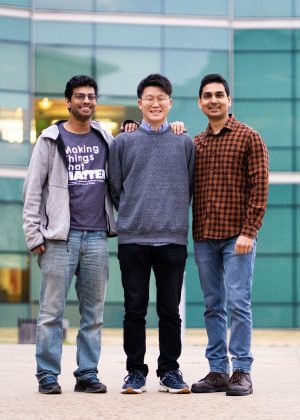
Research on AI Hardware Components Wins Poster Competition, Recognized in Top Journal

Dr. Jiyoung Kim, professor of materials science and engineering at The University of Texas at Dallas, and researchers in his lab were recognized for developing a high-performance selector and for publishing research on emerging non-volatile memory (NVM). Developing artificial intelligence (AI) hardware receives considerable attention for its potential, particularly because of its significantly enhanced power efficiency. Developing a more advanced selector and new memory components can help create hardware components that operate at low power, a must for enabling widespread use of AI technology.
Jiyoung Kim’s laboratory housed at the Erik Jonsson School of Engineering and Computer Science is making strides toward solving this big problem. PhD student Harrison Kim won best student presentation prize at the Non-Volatile Memory Technology Symposium in October 2019 for his work on developing a selector of crossbar arrays for potential AI applications. The Non-Volatile Memory Technology Symposium is a highly selective, invitation only event for academic and industry researchers working on conventional non-volatile memory. Researchers from Sandia National Laboratories, Intel, Microns, Applied Materials, STM Microelectronics, IBM and more sent representatives to the event.
Developing emerging NVM is equally important as developing a high-performance selector. Principal Investigator Jiyoung Kim and his group contributed research towards articles which were selected three times consecutively as an Editor’s Pick and featured article at Applied Physics Letters. Dr. Yongchan Jung and Dr. Heber Hernandez-Arriaga as well as Jaidah Mohan and Akshay Sahota from Jiyoung Kim’s group were co-researchers for the selector and NVM work.
Applied Physics Letters is widely considered a premiere publication for materials science researchers and features a strict publication process. The group’s research addressed techniques to solve common problems with creating commercial ferroelectric random-access memory (FRAM), an alternative type of random-access memory which uses about 99% percent less electricity than conventional dynamic random-access memory (DRAM).

Ferroelectrics can help in performing analog type NVM operations which can act as a hardware component for deep learning. Such ferroelectric materials were fabricated at a low temperature, 400 degrees Celsius. Mohan, who has been studying ferroelectric materials for his PhD, said, “These low temperatures can help in easy integration to the back end of line, or the second part of integrated circuit fabrication.”
Jiyoung Kim works closely with other UT Dallas materials science researchers including Dr. Luigi Colombo and Dr. Chadwin Young. His team’s work is highly esteemed within his field, attracting researchers across the globe.
“Without hesitation, I joined Dr. Kim’s laboratory,” Harrison Kim said. “The work is comprehensive and multidisciplinary. I was also interested in hands-on processing, working on the fundamentals of electronics and devices.”
Harrison Kim, who previously studied atomic layer deposition (ALD), a technique used for creating nanoscale electronics, while earning his master’s degree in South Korea, indicates that non-volatile memory is as important as a reliable selector in nanoelectronics. The group’s work toward reducing power dissipation, with billions of devices working on a single chip, will effectively enable AI technology to consume significantly less energy.







